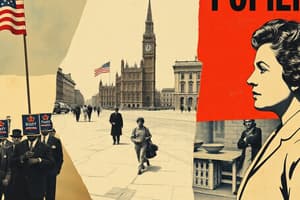Podcast
Questions and Answers
What was the main goal of Coxey's Army when they marched to Washington, DC?
What was the main goal of Coxey's Army when they marched to Washington, DC?
- To demand better wages for workers
- To urge Congress to pass public works legislation (correct)
- To promote L. Frank Baum's writings
- To protest against the Republican Party
What significant economic event began shortly after Cleveland's election?
What significant economic event began shortly after Cleveland's election?
- The Great Recession
- The Panic of 1893 (correct)
- The Great Depression
- The Industrial Revolution
Who was a prominent figure associated with the Populist Party during the 1890s?
Who was a prominent figure associated with the Populist Party during the 1890s?
- Abraham Lincoln
- William Jennings Bryan (correct)
- L. Frank Baum
- Jacob Coxey
What did the federal government primarily focus on during this period?
What did the federal government primarily focus on during this period?
What was one major factor contributing to the Depression of 1893?
What was one major factor contributing to the Depression of 1893?
Which railroad company’s closure is noted as a starting point for the economic crisis in 1893?
Which railroad company’s closure is noted as a starting point for the economic crisis in 1893?
How did the government respond to the requests made by Coxey's Army?
How did the government respond to the requests made by Coxey's Army?
What is one interpretation of L. Frank Baum's 'The Wizard of Oz' in relation to the political climate of the time?
What is one interpretation of L. Frank Baum's 'The Wizard of Oz' in relation to the political climate of the time?
What was the unemployment rate increase in a single year from 1893 to 1894?
What was the unemployment rate increase in a single year from 1893 to 1894?
By 1895, what unfortunate sight became common in American cities?
By 1895, what unfortunate sight became common in American cities?
Which character in 'The Wizard of Oz' is often interpreted as representing the American farmer?
Which character in 'The Wizard of Oz' is often interpreted as representing the American farmer?
What alternative party did many angry workers consider supporting after the events of Coxey's Army?
What alternative party did many angry workers consider supporting after the events of Coxey's Army?
What economic policy during the 1880s contributed to a brief recovery before the crisis?
What economic policy during the 1880s contributed to a brief recovery before the crisis?
Which character in 'The Wizard of Oz' is perceived to symbolize a leader lacking real power?
Which character in 'The Wizard of Oz' is perceived to symbolize a leader lacking real power?
How did industrial workers view the Populist Party during the economic hardships?
How did industrial workers view the Populist Party during the economic hardships?
What was an effect of banks and investors on the economy during the railroad expansion?
What was an effect of banks and investors on the economy during the railroad expansion?
Flashcards are hidden until you start studying
Study Notes
Farmers' Hardships and the National Depression
- Following President Cleveland’s election, the United States faced its worst economic depression, spurred by farmers' struggles.
- The economic slide began in the late 1880s, further exacerbated by the Panic of 1873, which resulted from over-leveraging on railroad bonds by banks.
- The 1893 Depression was triggered by rampant speculation in railroads, leading to a false sense of economic growth, which crumbled when railroad investments failed.
- Key railroad closures, starting with the Philadelphia & Reading Company, initiated a ripple effect through businesses and banks reliant on the railroads.
- Unemployment surged dramatically, climbing from 3% to nearly 19% from 1893 to 1894, with severe rates exceeding 35% in New York and 43% in Michigan.
Government’s Inability to Provide Relief
- The federal government struggled to address the rising unemployment and economic distress, revealing inefficiencies in its ability to support citizens.
- Americans, particularly industrial workers, began to look beyond the traditional two-party system for solutions, turning their attention to the Populist Party.
- The federal response was showcased by the failed march of Coxey's Army in 1894, led by Jacob Coxey, which called for public works initiatives to create jobs.
- Despite gathering a significant following, Coxey's Army faced governmental indifference, culminating in the arrest of its leaders for trespassing at the U.S. Capitol.
Cultural Impact and Allegory
- L. Frank Baum’s "The Wizard of Oz" has been interpreted as an allegory for the political climate of the time, potentially influenced by Coxey’s Army.
- The narrative can be seen to parallel the struggles of farmers and industrial workers: the Scarecrow as the farmer, the Tin Woodman as the worker, and the Cowardly Lion symbolizing William Jennings Bryan.
- Themes of frustration, quest for help, and ultimate disregard from authority are mirrored in the characters' journey toward Oz, paralleling the realities faced by Coxey’s Army.
Studying That Suits You
Use AI to generate personalized quizzes and flashcards to suit your learning preferences.




